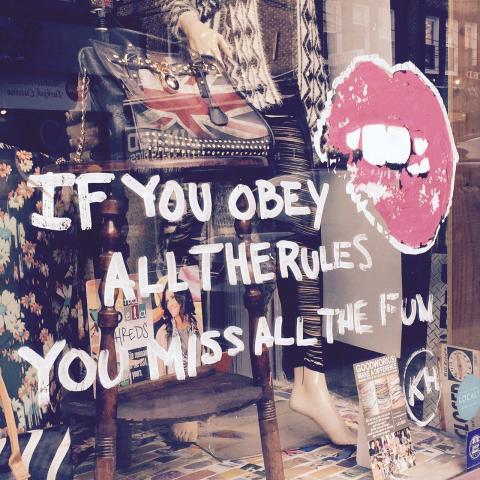The Buffer Zone of the Elephant in the Room (Revised Silence Essay)
By kregensburgSeptember 30, 2015 - 12:30

The Buffer Zone or the Elephant in the Room? : Looking at the Silence of Avoidance in American Classrooms
Serendip is an independent site partnering with faculty at multiple colleges and universities around the world. Happy exploring!

The Buffer Zone or the Elephant in the Room? : Looking at the Silence of Avoidance in American Classrooms


I was walking to Jody's house this morning, to pick up a ride to campus,
when I saw this in a store window on 4th street, and I began to smile,
anticipating today's discussion.


A recently released book, Black Silent Majority, by Michael Javen Fortner, offers a new and controversial explanation for the rapid increases in incarceration rates in the United States in the last few decades. Whereas Michelle Alexander argues (in The New Jim Crow) that drug laws simply took up the function of Jim Crow laws made illegal in the wake of the Civil Rights Movement, Fortner argues that the crucial laws of the 1970s as well as the policing practices that they prompted were strongly supported, in fact instigated by, African-Americans who wanted to "get tough on crime." As Fortner puts it in an op-ed published in the New York Times yesterday (Monday Sept. 28):

Today I modeled for everyone the need to have a back-up plan, when planning to meet outside doesn't work out. Last night, I'd had the lovely idea of our gathering in the Cloisters. Today I belatedly realized what a terrible idea this was, since the towers of Thomas Hall are being re-pointed, and there's lots of grating noise being created by this repair work. Creighton suggested that we re-locate in the the Quita Woodward Room, verified for us all that it was open, and guided us there. (Thank you, Creighton!)
Before today's class/discussion, I never really thought about how play can be problematic. In a way, play is a great opportunity for a lot of slippage to happen. When engaging in play, whether as an innocent child or a fully-concsious adult, you may say or do things that are offensive or hurtful to others without even realizing it. A child may choose to not play or onteract with another child because of the way they look or are, and if said child notices that they are being discriminated against, their feelings will be hurt and it can cause life-altering consequences to take place. Just now as I was typing that sentence I thought about how children can be so mean wihtout even realizing that they are being that way.

As we started out fourth week of class started we transitioned our topic of conversation to play. This got me thinking, why don’t we go outside and play ourselves? Why don’t we spice class up a little by changing our location? So I talked to Anne about it and she said we could try it! So on Thursday, September 24, 2015, our ESem class, Changing Our Stories, held its first class outside of the classroom. We held class on the green in between Taylor and Denbigh. Anne gave me the chance to start the class off with a little get to know you activity. I chose to do a name game because learning names is something I struggle with and learning each other’s names is exceptionally important. I think the game went well as well as the experience of the class overall.

http://www.nj.com/news/index.ssf/2015/09/pope_in_philly_local_homeless_shelter_serves_needy.html
http://www.newsweek.com/pope-francis-visit-homeless-new-york-city-bill-de-blasio-bill-bratton-375202

I met my elementary school best friend on the first day of first grade and we quickly became inseperable. As the years progressed we stayed close but also had some separate friends. In around third grade, there was another girl who became close with my best friend. This was fine with me, because we both had our own friends but always remained closest friends with each other. The other girl however, was not ok with her new friend having another best friend and she was extremely jealous and vengeful towards me. She would focus so much time on trying to get and keep my friend's attention creating a bad situation for both me and my friend.

When I was in elementary school, I had a friend who was a couple years younger than me. We would play at either my house or hers. Sometimes we swam in her pool or played with her toys inside or at my house on my swing set and in my yard. When we were alone, we played well together. She and I would sometimes even play in solitude, but together, usually when we did crafts or built fairy houses. However, I started to notice she would not be as agreeable when we played at her house or her mom was chatting with my mom at ours. She would create situations where I was the wrongdoer and she was the victim. She would make small disagreements into larger inequalities, where I had done something to offend her even if I had just pointed out a different view on the play situation.